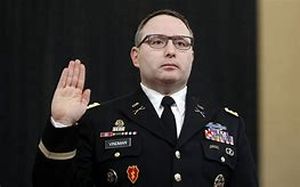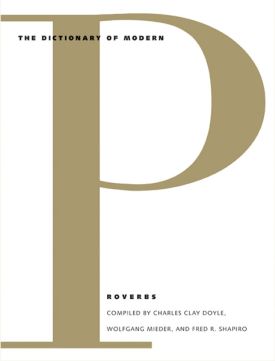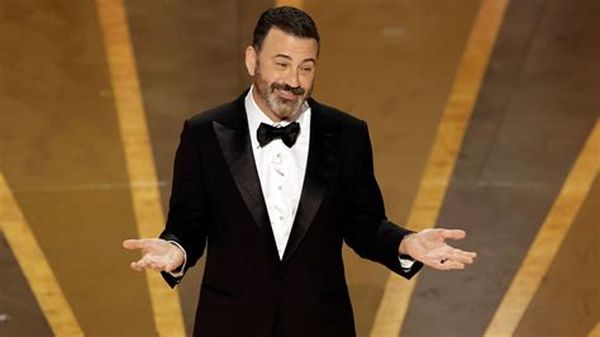Uncivil service
From The New CriterionIn one way at least, it seems a pity that Representative Adam Schiff’s House Intelligence Committee’s impeachment inquiry turned out to be such a box-office dud. In times less fevered than ours, the parade of self-important State Department functionaries who appeared as witnesses against the President would have been seen by dispassionate observers as confirming every disobliging thing he has ever said about “the Swamp” or the so-called “Deep State” in Washington that he ran against in 2016. That Mr Schiff himself may have worried about this possibility is suggested by his refusal to call the original “whistle-blower” as a witness — or even to disclose his identity. A man seemingly so lacking in self-awareness as Mr Schiff must have a smidgen of it tucked away somewhere in the dark corners of his soul — enough at least to know that putting a rank-and-file member of the ever less-respected “intelligence community” at the head of these self-righteous jacks-in-office would have made it too obvious that something other than public-spiritedness had led them to come forward to assist him and other House Democrats in deposing an elected president.
It was pretty obvious as it was. As Angelo Codevilla, that most knowledgeable and incisive of commentators on the dysfunctional intelligence services put it:
Dogs biting humans being naturally unremarkable, any attempt to convince us to regard accounts of their biting as noteworthy events leads one to ask whether the person advancing that position is ignorant of nature, or is toying with us. By nature, instances of bureaucrats speaking ill of their elected superiors are equally unremarkable and lead us to ask the same questions. . .Usually, there is no more reason to pay attention to establishment bureaucrats opposing a president elected to oppose them than there is to dwell on dogs biting whomever frightens them. But now the Democratic Party is using what little remains of the intelligence agencies’ credibility as the sword with which to strike Trump and the claims to secrecy of those agencies as the shield from behind which to do it. In other words, it is doing just what it did during the Russian-collusion scam. That is why the scam itself is the story.
That is also why the long-running media campaign against the President took a new turn while Mr Schiff’s impeachment inquiry was still underway: in order to head off public attention to the story of the scam and redirect it towards the courage, the nobility, the high-principled patriotism of the scammers. Michelle Cottle of The New York Times showed the way back in October: “They Are Not the Resistance. They Are Not a Cabal. They Are Public Servants,” she (or her headline-writer) wrote. As so often in the Rutenberg-era New York Times, you have to reverse the negatives and positives to get any idea of the truth. To believe Ms Cottle’s disclaimers you would have firmly to close your eyes to the abundant evidence, which none of them even attempted to hide, that these State Department careerists thought not just that they ought to be running American foreign policy instead of the President but that they were entitled to run it, if not by the Constitution (which gives that responsibility to the elected chief executive) then by their own superior intelligence and the moral standing they imagined it conferred upon them. Lieutenant Colonel (as he demanded the ranking member of the committee address him) Alexander Vindman gave the game away when he kept referring to “the Interagency” — something which has no constitutional or even administrative existence but seems to mean nothing more than the bureaucratic consensus of the day — as the ultimate authority to which even the President was expected, by implication, to submit himself.
Michelle Cottle herself had to acknowledge at the outset of her column that her take on these “public servants” meant that “President Trump is right: The deep state is alive and well.” But the point is, you see, that this is a good thing — because, like her New York Times colleague James B. Stewart, she regards the deep staters as heroes. Both would echo former acting CIA chief John McLaughlin’s cry: “Thank God for the deep state.” This is not something the president’s critics were saying up until a month or two ago, which may be why Ms Cottle thought she should stick her neck out a little to declare that the whistle-blower and his confederates were “not the sinister, antidemocratic cabal of [Mr Trump’s] fever dreams” but “a collection of patriotic public servants — career diplomats, scientists, intelligence officers and others — who, from within the bowels of this corrupt and corrupting administration, have somehow remembered that their duty is to protect the interests, not of a particular leader, but of the American people.”
Readers of The New York Times may believe that, but I don’t think many others will. If this is indeed what such disaffected underlings have “remembered” it is only by virtue of forgetting that their oath of loyalty was sworn neither to “a particular leader” nor to “the American people” but to the Constitution and therefore to the constitutionally elected president whose “interests” nobody up until the day before yesterday ever supposed it to be any of their business to judge. But these are revolutionary times, as I may have mentioned before, and nobody on either side of our polarized politics ever seems to think of the Constitution anymore as anything other than a ritual piety — unless there is something to be found in it that can be construed as supportive of whatever it is he or she wants to do. We are all now like those liberal judges who can only find in the Founding document permissions to, never constraints upon, their own unbridled will.
A month later, Ms Cottle had abandoned any claim that her heroes were not the Resistance. Not only were they glorious resisters in themselves but they shed some of their heroic effulgence on their fellow bureaucrats, hitherto toiling in obscurity:
Once upon a time, government officials were largely thought of as dreary drones — that is, when anyone bothered to think of them at all. But along came President Trump, and suddenly, these largely unknown operators have assumed an aura of mystery, danger even. For those who don’t see them as treasonous denizens of the swamp Mr. Trump was elected to drain, they are heroes of the resistance, calling out the excesses of an out-of-control president. Once again, Mr. Trump seems to have accomplished something that no one imagined possible: He has made civil servants sexy.
Such admiration, amounting almost to adulation, of a shadowy anti-Trump movement within the permanent government of which it had previously been Democratic and media orthodoxy to deny the existence, cannot have been entirely unconnected to the imminent release of the Department of Justice’s Inspector General’s report into FBI abuses of power during and after the 2016 election campaign. As I write before that report’s release, I must rely on preliminary indications and leaks for the suggestion that it is going to make no serious criminal referrals of anyone above a pretty junior level of the FBI. There are also leaks to the effect that Attorney General Barr does not agree with the conclusion of Michael Horowitz, the IG, that the FBI’s application for surveillance warrants against members of the Trump campaign were well-founded, in spite of their reliance on the famously unreliable Steele dossier. If, as the indispensable Andrew McCarthy writes,
the Horowitz report is going to take the tack that, because Russia did in fact meddle in the 2016 campaign, any investigative overreach amounts merely to regrettable but understandable overzealousness, that would be a very big deal — and not in a good way. The question is not whether Russia meddled. On four separate occasions, the FBI and the Justice Department solemnly told the [Foreign Intelligence Surveillance Court] there were grounds to believe that Carter Page and others in the Trump campaign, potentially including Donald Trump himself, were complicit in a criminal conspiracy with the Kremlin. The question is: What was their compelling basis for making that explosive representation, which breached the American norm against government intrusion in our political process?
If ordinary Americans start asking that question, even the expected circling of the bureaucratic wagons might not be enough to save these earlier but less celebrated heroes of the Resistance from the ignominy that Mr Horowitz is said to want to spare them.
There are also promised indictments to come from special counsel John Durham, perhaps of some of these same deep state heroes who were behind the discredited Russian “collusion” narrative, now conveniently forgotten by those trying to re-make that movie but with a different cast of characters — apart, that is, from the supervillain both sets of heroes have been attempting to take down. The media build-up for the Colonel Vindmans and the Fiona Hills of Ukraine-gate could be expected not only to protect them from too-close a scrutiny of their motives but to prepare the ground for the media’s defense of the McCabes and Strzoks and Comeys who may be found to have committed the odd act of perjury or to have illegally leaked classified information but who may be relied upon to have been as nobly motivated as their newly sexy successors.
What used to be thought of as the “news” pages of the New York Times made their own contribution to the lionizing of disaffected bureaucrats when, with typical lack of irony, they announced that “Trump’s War on the ‘Deep State’ Turns Against Him” — as if the whole point about the deep state (whose existence the headline writer’s quotation marks suggest the Times is officially if absurdly still denying) wasn’t that it was “against him” from the beginning. The idea being pushed by Peter Baker, Lara Jakes, Julian E. Barnes, Sharon LaFraniere and Edward Wong, all of whom are credited as co-writers, seems to be that these highly principled bureaucrats were innocent non-partisans quietly going about their constitutional business until Mr Trump “distrusted and disparaged” them, whereupon they were driven, maugre their head, to oppose him.
“With all the denigration and disparagement and diminishment, I think you are seeing some payback here, not by design but by opportunity,” said Representative Gerald E. Connolly, a Democrat from Washington’s Virginia suburbs who represents many federal employees. “It’s almost karmic justice. All of a sudden, there’s an opportunity for people who know things to speak out, speak up, testify about and against — and they’re doing so.” Current and former officials like Marie L. Yovanovitch, Fiona Hill and George P. Kent told House investigators how the government was circumvented by a rogue foreign policy operation on Mr. Trump’s behalf. Michael McKinley, a four- time ambassador and senior adviser to Secretary of State Mike Pompeo, described resigning after four decades at the State Department over the treatment of the career foreign service. Even the original Anonymous is back, the unidentified author of a much-discussed essay in The New York Times last year claiming that officials within Mr. Trump’s administration were working “to frustrate parts of his agenda and his worst inclinations.” The writer, still unnamed, plans to publish a book next month called “A Warning.”The witnesses heading to Capitol Hill do not consider themselves part of any nefarious deep state, but simply public servants who have loyally worked for administrations of both parties only to be denigrated, sidelined or forced out of jobs by a president who marinates in suspicion and conspiracy theories. But it is also true that some career officials, alarmed at what they saw inside the corridors of government agencies, have sought ways to thwart Mr. Trump’s aims by slow-walking his orders, keeping information from him, leaking to reporters or enlisting allies in Congress to intervene. And so what is “karmic justice” for the career establishment feels like validation to Mr. Trump and his circle that they were right all along.
In short, by imagining a non-existent conspiracy against him, the President actually conjured a real conspiracy against him into existence. Apart from the obviously disingenuous and self-serving nature of such a claim, it implied that civil servants, though not their boss, were or ought to have been immune from criticism, and that such criticism from an elected superior amounted to a justification for the latter’s removal from office. How far adrift such speculation is from factual reporting is something that, like the substantive Constitution, is of no interest to the narrative-pushers of The New York Times, nor can their narrative explain away the plain fact that “Mr Trump and his circle” were right all along about the deep state, even if proleptically.
To those not disposed to accept without questioning it the New York Times account — and after the two-and-a-half year debacle of Collusion-gate this must include a fair number even of their most Trump-hating subscribers — there are thus two competing narratives between which they must decide. In the Times’s account, members of the implicitly trustworthy “intelligence community,” in cooperation with the public-spirited media, suspected wrong-doing, even of a quasi-treasonous nature, on the part of Mr Trump or his associates and sought to uncover it. They may have exceeded their authority in trivial ways out of sheer patriotic indignation, but they inadvertently sparked so furious a reaction on the part of the President that a set of equally non-political State Department colleagues were moved to come forward with a completely different set of complaints of disloyalty, based on his plainly criminal desire to know more about potentially corrupt behavior by members of the previous administration.
In the second narrative, an unelected bureaucratic elite and a politically engaged media, united in their contempt for an inexperienced and socially dubious media figure unaccountably placed in authority over them by ignorant and even more socially dubious voters, worked together constantly and untiringly, beginning even before he was elected and proceeding by any means necessary, legal or illegal, to rid themselves and the country of such an uncouth boor before the country could be allowed to make the same mistake a second time. If this latest effort at impeachment should fail, however, we can look forward to the election next year as a referendum on which of these two narratives are believed by “the American people,” to whom both sides appeal: that of The New York Times or that of Mr Trump. I can’t imagine that that is a position savvy Democrats will wish to find themselves in, but revolutionary self-confidence coupled with sheer hatred of the President may yet carry the day for them..
Discover more from James Bowman
Subscribe to get the latest posts to your email.






